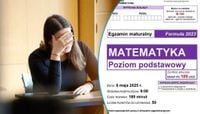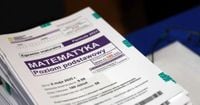The mathematics Matura exam for 2025 took place on Tuesday, May 6, 2025, marking a significant milestone in the academic journey of Polish high school students. Maturzyści, or high school graduates, had 180 minutes to tackle a series of mathematics problems designed to assess their understanding and skills.
As the clock struck 9:00 AM, students across the country began their examination, which consisted of both closed and open-ended questions. This year, a maximum of 50 points could be scored on the exam, and to pass, students needed to achieve at least 30% of the total points, which translates to a minimum of 15 points.
Results for the Matura will not be revealed until July 8, 2025, adding an element of suspense for students who are eager to know how they fared. In the meantime, students and educators alike have begun to share their experiences and insights regarding the exam's difficulty level.
According to Kornelia Duda, a mathematics teacher and author of a popular Matura preparation course, the exam was “doable” even for students who might struggle with mathematics. "The level of difficulty was comparable to previous years, and I believe that if students practiced with past exam papers, reaching the 30% threshold should not pose a significant challenge," she noted.
Many students echoed Duda's sentiments, with some describing the exam as relatively straightforward. Stanisław Białas, a student from II Liceum Ogólnokształcące in Koszalin, expressed optimism, stating, "I think the Matura was definitely manageable. I hope for a good result, although I am more focused on humanities subjects for my future studies."
Another student, Kasia, from the same school, shared her confidence: "I definitely handled the math exam well. I study in a biology-chemistry class, and I feel that I performed better than on yesterday's exam."
The exam format included various types of questions, such as multiple-choice, true/false, and tasks requiring short written answers. It covered a broad range of topics, including quadratic inequalities, optimization problems, logarithms, and the value set of functions. Teachers emphasized the importance of familiarizing oneself with the exam structure and practicing with previous years’ papers to enhance preparedness.
Paweł Rudecki, the director of I Liceum Ogólnokształcące im. St. Dubois in Koszalin, highlighted the significance of practice in mastering mathematical skills. He advised students to utilize all available resources, whether through exercise books or online platforms, to hone their abilities. "Understanding how to use mathematical tables can save students precious time during the exam—time that can be the difference between success and failure," he explained.
Students were allowed to bring certain materials to the exam, including a pen or fountain pen with black ink, an identification document, a ruler, a compass, and a simple calculator. Additionally, schools provided mathematical tables to assist students during the examination.
The Matura is a crucial rite of passage for Polish students, as it determines their eligibility for higher education. It is one of three mandatory written exams, alongside Polish language and a foreign language. The main exam session began on May 5, 2025, with the Polish language test, followed by mathematics, and will continue with foreign language exams.
Looking ahead, the exam schedule includes a variety of subjects, with foreign language exams on May 7, 2025, and advanced-level subjects like biology and philosophy following on subsequent days. The advanced mathematics exam is scheduled for May 12, 2025, at 9:00 AM, further testing students' mathematical prowess.
As students await their results, many have taken to social media to discuss their experiences and the challenges they faced during the exam. Some noted difficulties with specific tasks, particularly those involving percentages, optimization, and areas of triangles. The discussion has been lively, with students sharing both their successes and frustrations.
In the wake of the exam, educators are also reflecting on the overall performance of students. Tomasz Kozicki, another mathematics teacher, remarked that the exam effectively assessed typical skills that have appeared in previous years. He pointed out that students who were well-prepared would likely find the exam manageable.
However, the exam was not without its challenges. Duda noted that some questions contained “traps” that could confuse students, particularly those requiring logical reasoning and a thorough understanding of mathematical concepts. She highlighted an open-ended question regarding percentages that deviated from previous formats, requiring students to construct and solve equations based on a longer narrative—a task that can be daunting for many.
Overall, the mathematics Matura exam of 2025 has sparked a mixture of confidence and anxiety among students. As they reflect on their performance and prepare for upcoming exams, the focus now shifts to the results that will shape their educational futures. With the anticipation building, students are left to ponder their next steps as they await the official announcement of their scores in July.
As the Matura continues through May, it remains a pivotal moment in the lives of Polish high school graduates, opening doors to further education and career opportunities. The journey is far from over, and for many, the best is yet to come.





